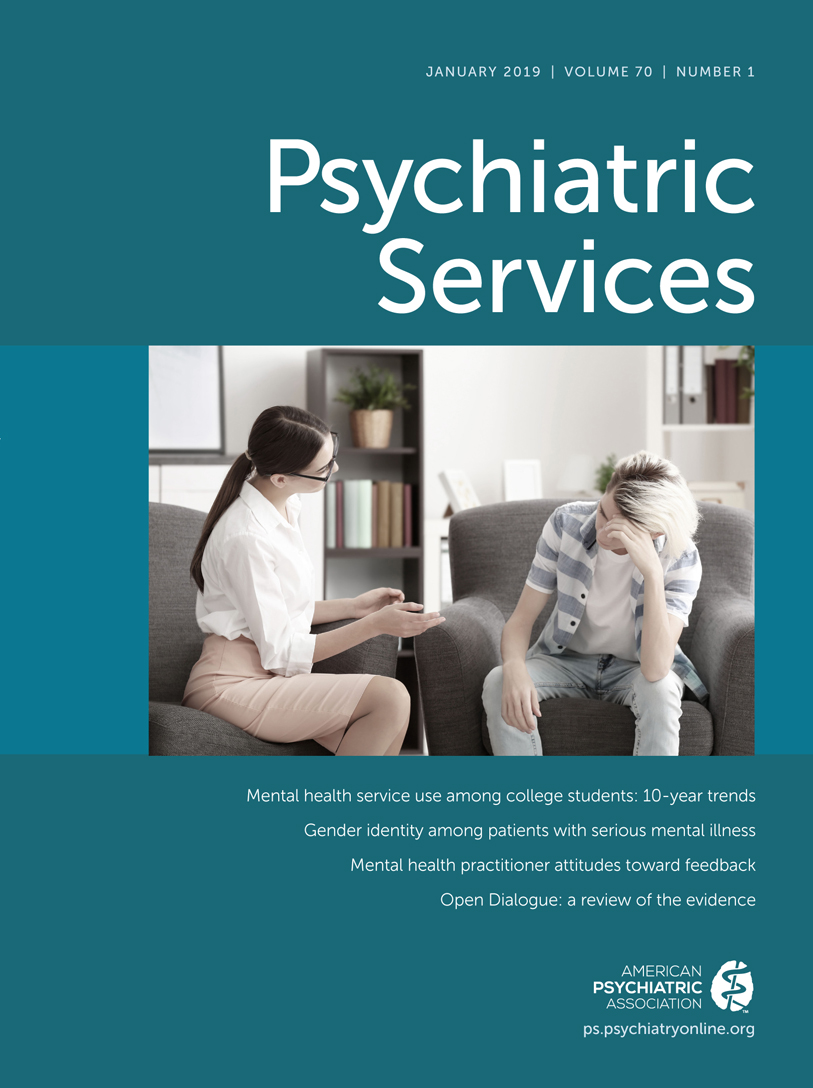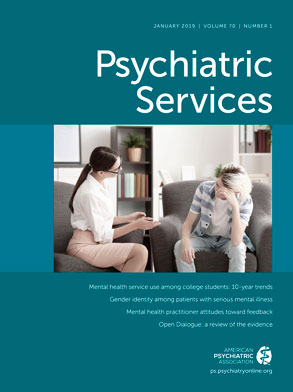The collaborative care model (CoCM) can be an essential component of the global strategy to address the large burden of mental illness (
1,
2). CoCM includes four core components: a team consisting of primary care providers (PCPs), a behavioral health professional, and a consulting psychiatrist; evidence-based treatment; measurement-driven care to track patient’s symptoms; and a population-level approach so that the limited time of the psychiatrist is used to supervise the care of a large panel of patients rather than conduct direct patient evaluations (
1).
In many low-resource settings, the psychiatrist is prohibitively far from the primary care clinic site, and the team uses teleconsultation instead of in-person clinical supervision. Such remote consultation models have been used in the Unites States and abroad, showing varying efficacy to improve mental health outcomes (
3,
4).
This mixed evidence stands in contrast to the overwhelmingly positive evidence of CoCM with in-person consultation (
5,
6). Based on our experience in studying CoCM in a primary care clinic in rural Nepal, we discuss the challenges and strategies to address them. We hope that this may inform adaptation and implementation in other low-resource settings where remote consultation is necessary.
Our intervention is conducted in a general clinic in a government-owned hospital operated in partnership with Possible, a nonprofit organization. The clinic is staffed by 20 PCPs who deliver care to 300–400 patients per day. The clinic’s catchment area suffers from severe economic and geographic marginalization and is 14 hours from the nearest full-time psychiatrist (
1). The consulting psychiatrist for this intervention was based in Kathmandu, a 30-hour bus ride from the site. Three counselors with six months of behavioral health training and 18–36 months of medical training function as the care coordinators, presenting patient history and treatment plans to the psychiatrist and then conveying the psychiatrist’s recommendations to the PCPs. For our study, we recruited counselors, whom Nepal, like most low- and middle-income countries, does not formally incorporate into its core workforce. We outline common challenges and strategies based on a two-year study using CoCM with teleconsultation to deliver care for depression, psychosis, and posttraumatic stress disorder.
Poor Mental Health Competencies and High Turnover Among PCPs
As in most medical schools in low- and middle-income countries, those in Nepal do not include any mental health training (
7). Consequently, PCPs may not use evidence-based practices. Because the psychiatrist is off site, providing ongoing training and guidance can be difficult. In addition, the high turnover in rural areas leads to new PCPs replacing trained ones.
We have addressed the challenges of high turnover and lack of mental health competencies via three strategies: deploying an online video-based training program that allows rapid training for new PCPs and scheduled retraining for existing PCPs, even when the psychiatrist is off site (
8); having the psychiatrist conduct quarterly site visits to provide in-person training; and ensuring that the psychiatrist recommendations are written for PCPs who may have minimal prior mental health training. For example, instead of advising PCPs to “increase the antidepressant dose,” the recommendation may be to “increase fluoxetine from 20 mg to 30 mg daily and recheck patient’s Patient Health Questionnaire–9 (PHQ-9) scores in six weeks.”
Need for Urgent Consultations
During weekly, scheduled panel reviews, the clinical team discusses all the new cases and high-priority follow-ups with the off-site psychiatrist. However, there is a need for a system to address urgent issues that arise during the week. Because there are 20 PCPs in the clinic, having them directly call the off-site psychiatrist with urgent issues was unfeasible. We streamline such calls via the counselors. PCPs with urgent questions discuss the case with the counselor, who is always on site. The counselor reviews the case and calls the psychiatrist if needed. This allows the psychiatrist to prioritize the phone calls originating from the counselors and to train the counselors to handle similar issues in the future.
Psychiatrist Discomfort With Lack of Direct Patient Contact
Delivering treatment recommendations without directly evaluating the patient is a common challenge for psychiatrists involved in CoCM. When the psychiatrist is off site, this is more challenging because they are even further removed from clinical encounters. This discomfort can be addressed by building a trusting relationship between the on-site clinicians and the off-site psychiatrist and helping the psychiatrist develop an accurate understanding of the capacities and limitations of the on-site clinicians. Both of these strategies require face-to-face contact. To achieve this and to provide the refresher training described earlier, the psychiatrist makes quarterly on-site visits. During such visits, the psychiatrist spends substantial time observing PCPs as they evaluate patients and manage treatment. In addition, the team conducts a panel review on site. This provides the psychiatrist an opportunity to hear the clinical team present a case that the psychiatrist also had an opportunity to directly observe. This experience helps the psychiatrist develop a clear understanding of the clinicians’ mental health competencies. For example, if the psychiatrist observes the clinician asking the PHQ-9 questions in a methodical, disconnected manner, the credibility of the reported score diminishes. On the other hand, if the psychiatrist observes a clinician adeptly obtaining history of the patient’s past trauma, the psychiatrist will feel more comfortable asking that same clinician to obtain trauma history from other patients.
Unreliability of Electricity and Technological Tools
Regular weekly communication for panel review, which is the cornerstone of CoCM, requires reliable electricity and telecommunications. In low-resource settings, power, phone, and Internet disruptions can be common. We address this in two ways. First, we emphasize to the health systems leadership that mental health care integrated into a weak primary care infrastructure (which includes energy and communication) is unlikely to succeed. Implementing remote collaborative care can provide further incentive to make additional investments to strengthen the overall infrastructure. However, given the relative low priority of mental health services, this argument may not always result in additional investments. Second, we use a system of redundancies. Given the multiple benefits of a robust energy system and the high risk of unreliable power, the site has a triple-phase connection from the main grid, a solar backup for main grid outages, and gasoline generators as additional backup. Similarly, the clinical team uses a hierarchy of communication strategies based on the functioning of the various systems: video conferencing, followed by audio-only conferencing using Google Hangouts, Skype, Viber, WeChat, or a regular phone call.
Documentation and Delivery of Treatment Recommendations
In some CoCM interventions, the psychiatrist directly provides recommendations to the PCPs. Because most general clinics in low- and middle-income countries, including Nepal, operate in an urgent care model, patients do not have designated PCPs on prescheduled appointments. Even if the psychiatrist provided recommendations to a PCP who just saw a patient, that same patient may be seen by a different PCP during the follow-up visit. Given this reality, we use the model where recommendations are delivered to counselors, who then convey them to the PCPs.
Nepal has a severe shortage of counselors with medical skills, a necessary skill set for conducting panel reviews with the psychiatrist. The counselors recruited for our program often have completed only six months of behavioral health training after high school and have received no medical training. Therefore, there have been challenges in accurate documentation of clinical recommendations that were provided by the remote psychiatrist. Because of the nature of remote consultation, there is a higher likelihood of low-fidelity communication because participants may experience technical problems and may not pick up on nonverbal cues that are apparent during an in-person interaction. For example, a psychiatrist may be able to detect concern or confusion in the counselor when they are speaking face to face, but such reactions can be missed during teleconsultation. We address this in three ways. First, we employ counselors with some prior medical background or support nonphysician PCPs (similar to physician associates or nurse practitioners in the United States) to receive the six-month psychosocial counseling training. This allows us to develop a cadre of health workers with medical and behavioral health competencies. Second, we ask the counselors to read back the specific recommendations so that the psychiatrist can ensure fidelity. These finalized recommendations are then entered into the electronic health records system and are visible to PCPs. Third, we prioritize video conferencing whenever possible, to facilitate transmission of nonverbal communication.
On-Site Clinicians’ Low Motivation to Accept Psychiatrist Recommendations
When electronically informed of treatment recommendations from an off-site psychiatrist, PCPs occasionally may feel defensive about comments that are critical of their assessment and treatment plans. The lack of in-person interactions can breed resentment, with the psychiatrist unaware of how the PCP may be receiving the recommendations emotionally.
To address this, we incorporate three strategies. First, we ensure that positive feedback is provided along with recommendations to modify treatment planning so that PCPs are not being alerted only about their errors. Second, the PCP alert includes not only the recommendation but also the rationale behind it. PCPs gave feedback that the rationale contextualizes the psychiatrist’s recommendations and enhances PCP motivation to follow them, while also improving the PCP’s mental health competencies. Finally, the quarterly site visits provide an opportunity to put a face on electronic communication and to develop positive relationships with the PCPs. The psychiatrist also uses this time to validate the PCP’s experiences that learning new clinical skills based on brief training sessions is particularly challenging. The psychiatrist further emphasizes that the goal is to build a system of collaborative treatment planning rather than to point out individual errors. Such conversations are much more effective when conducted in person than remotely.
Mismatch Between the Psychiatrist’s Recommendations and the Site’s Capacity to Implement Them
Off-site psychiatrists often practice in urban, academic, and/or high-resource settings, where a wide range of diagnostic tests and treatment options (including both medications and psychotherapy) is available. When such psychiatrists provide teleconsultation to a rural site with limited capacity, there may be a mismatch between what psychiatrists use in their daily practice and what can be implemented on site. In Kathmandu, for example, numerous antipsychotic medications are available, whereas the rural site uses the Nepali government’s essential medications list, which includes only chlorpromazine and haloperidol. Urban psychiatrists may not be comfortable using medications from the site’s formulary.
To bridge this gap, we have provided psychiatrists training in protocols based on the essential medications list (
9). This challenge further emphasizes the need for regular site visits so the psychiatrist can understand the evolving capacities and limitations of the primary care clinic. Our program had previously piloted asynchronous consultation (i.e., e-mail based), which led to greater mismatch. Our current intervention uses synchronous teleconsultation (i.e., the consultant and counselor communicating in real time), which provides rapid feedback to the psychiatrist if the recommendations are not feasible (e.g., the psychiatrist recommends medications or tests that are unavailable on site). In parallel, these mismatches have prompted the psychiatrist to successfully advocate for improved capacity, such as adding blood tests for thyroid function or expanding the formulary to include smaller doses of fluoxetine capsules to allow smoother medication titration.
Conclusions
Teleconsultation poses several challenges that may not be apparent in CoCM interventions using in-person supervision. Failure to directly address these can result in poor effectiveness of an otherwise robust model to expand access to mental health care. Most of our strategies are based on providing adequate training and support for the team members, ensuring regular site visits to conduct tasks that cannot be accomplished remotely, strengthening the overall health care system, and understanding and improving team members’ motivation and morale. In the future, it will be important for us to further strengthen local supervision by using validated tools to assess therapist competence (
10). These strategies, and the challenges they address, may assist other low-resource settings in employing teleconsultation to improve the quality of mental health care services.

